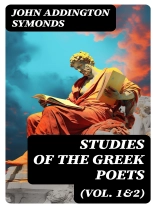In ‘Studies of the Greek Poets, ‘ John Addington Symonds delves into the rich tapestry of Greek literary heritage, presenting an erudite analysis of the lyrical and dramatic works from antiquity. With a keen eye for poetic form, Symonds’s prose reflects his admiration for the aesthetic qualities of Greek poetry, as he examines the lives and influences of renowned poets such as Sappho and Pindar. The dual volumes are characterized by Symonds’ eloquent style, which harmoniously blends literary criticism with historical context, illuminating the profound relationships between poetry, culture, and society in ancient Greece. John Addington Symonds (1840-1893), a pioneering figure in the study of Renaissance literature and gay rights, infused his scholarly pursuits with personal passions and experiences. His background as a poet and a classicist allowed him to articulate not only the beauty of the works he studied but also their emotional resonance and relevance to contemporary identity. His historical context, marked by Victorian constraints, propelled him to explore themes of sexuality and beauty through the lens of classical tradition. ‘Studies of the Greek Poets’ is an invaluable resource for scholars and lovers of literature alike. Symonds invites readers to explore the depths of human expression as articulated by ancient voices, providing insight that resonates well beyond the bounds of history. This work is essential for anyone seeking to enrich their understanding of the roots of poetic tradition and its enduring impact on modern literature.
Про автора
John Addington Symonds (1840-1893) was a distinguished English writer and art critic, known for his prolific contributions to Victorian literary and cultural studies. His erudition across a wide array of subjects, including Greek literature and Renaissance art, has been esteemed by scholars and readers alike. Symonds is perhaps best known for his comprehensive work ‘Studies of the Greek Poets’ (Vol. 1 & 2), which represents a sweeping analysis of Greek poetic tradition, tracing its evolution from the Homeric epics to the later lyric poets. His lucid prose and insightful assessments bring the reader closer to the timeless value of ancient Greek poetry, examining not only the literary merits but also the sociocultural milieu in which these works were conceived. Besides his literary accomplishments, Symonds was a pivotal figure in the history of homosexual literature, contributing to the understanding of sexual psychology with works such as ‘A Problem in Modern Ethics’ (1891). Symonds’s interpretative approach, marked by both empathic appreciation and critical acumen, reflects a synthesis of Romantic idealism and scholarly rigor that was characteristic of the late 19th-century intellectual milieu. His legacy endures not only in his extensive bibliography but also in his influence on subsequent generations of writers and thinkers who navigated the complexities of aesthetics, sexuality, and identity.












